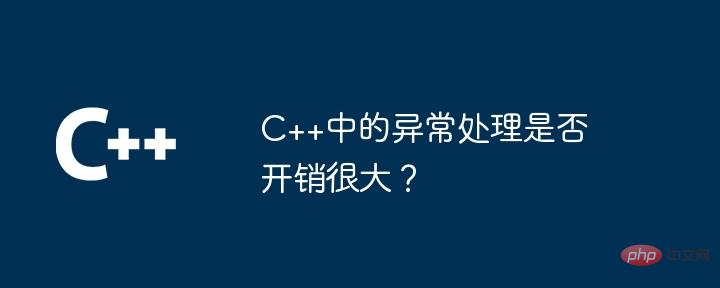Home >Backend Development >C++ >Is exception handling in C++ expensive?
Is exception handling in C++ expensive?
- WBOYWBOYWBOYWBOYWBOYWBOYWBOYWBOYWBOYWBOYWBOYWBOYWBOriginal
- 2024-06-06 10:34:56481browse
Exception handling overhead in C++ includes unwinding stack and exception object allocation. Exception handling can be optimized by avoiding catching irrelevant exceptions, using try-catch blocks, propagating exceptions, and using the noexcept keyword to reduce stack unwinding and memory overhead.

#Is exception handling in C++ expensive?
There is some debate about exception handling in C++. Some think it is too clunky and consumes too much performance, while others think it is necessary to handle exceptions.
Exception handling overhead
In C++, the main overhead of exception handling lies in the following aspects:
- Unwinding stack:When an exception occurs , the program must unwind the function call stack to determine which exception handler to call. This can be a time-consuming process.
- Exception objects: Exceptions are passed through objects, which are allocated and stored in heap memory. This increases memory overhead.
Optimize exception handling
In order to reduce the overhead of exception handling, there are some techniques below:
- Avoid catching irrelevant exceptions:Catch only those exceptions that the application can reasonably handle.
- Use try-catch blocks: Catching exceptions within a specific scope can reduce the overhead of unwinding the stack.
- Propagate exceptions: If the exception cannot be handled, the exception can be propagated to the calling function. This avoids unnecessary unwinding of the stack.
- Use the noexcept keyword: For functions that have no possibility of exceptions, you can use the noexcept keyword to prevent exception handling code from being generated at compile time.
Practical case
The following code example shows optimized exception handling:
void processData(int* data, int size) throw(std::out_of_range) {
if (data == nullptr || size <= 0) {
throw std::out_of_range("Invalid input");
}
// 进一步处理数据
}
int main() {
int* data = nullptr;
int size = 0;
try {
processData(data, size);
} catch (std::out_of_range& e) {
// 处理异常
}
return 0;
}In this example:
- Function
processDataUse thenoexceptkeyword to prevent the generation of exception handling code, since it is the only point at which astd::out_of_rangeexception may be thrown. - Exceptions are only caught in the
mainfunction, reducing the overhead of unwinding stacks. - The creation and destruction of exception objects are only performed when an exception occurs, thus reducing memory overhead.
The above is the detailed content of Is exception handling in C++ expensive?. For more information, please follow other related articles on the PHP Chinese website!

